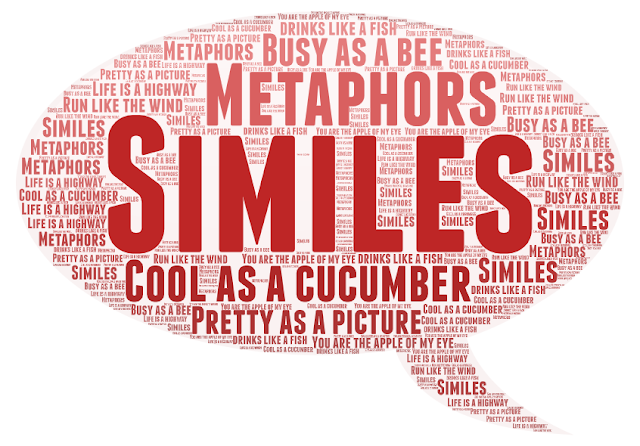A simile is a literary technique that is used to compare two concepts. These concepts might be completely different in all aspects, but when they are being compared, there is that one distinct concept that draws a similarity between them. The comparison is usually carried through with words like As, Like, and Than. A characteristic style of the usage of similes is that the two objects that are being compared remain different in all matters and the reader has no doubt about the same.
Example of Simile
David’s words felt like shards of glass when he spoke such hateful things.
Explanation
In the example given above, in the case of a simile, David’s words are compared to shards of glass, which means that just as the shards of glass would lead to immense hurt, similarly, his words are just as hurtful and cause for as much hurt.
ADVANCED ENGLISH: The Metaphoric Expressions Essential For Achieving a
B2 to C2 Level of English.
Common Similes
~ As quiet as a mouse
As quick as a flash
As white as a sheet
As brown as a berry
As red as a beetroot
As black as night
As sick as a dog
To sleep like a log
As sick as a parrot
As blind as a bat
As alike as two peas in a pod
As big as an elephant
As black as coal
As bright as a button
As brave as a lion
As bold as brass
As busy as a bee
As clean as a whistle
As clear as crystal
As clear as a bell
As cold as ice
As common as dirt
As blue as the deepest ocean
As stubborn as a mule
As soft as silk
As cool as a cucumber
As cunning as a fox
As dead as the dodo
As deaf as a post
As dead as a doornail
As different as chalk from cheese
As dry as a bone
As drunk as a lord
As dull as dishwater
As dry as dust
As easy as A.B.C.

80 Essential Advanced English Phrases to Learn.
As flat as a pancake
As easy as apple-pie
As fresh as a daisy
As free as a bird
As gentle as a lamb
As hot as hell
As hungry as a wolf
As light as a feather
As innocent as a lamb
As mad as a hatter
As pale as death
As obstinate as a mule
As mad as a hornet
As old as the hills
As proud as a peacock
As poor as a church mouse
As quick as a wink
As plain as day
As sharp as a razor
As silent as the dead
As slippery as an eel
As slow as a snail
As smooth as silk
As sour as vinegar
As stiff as a board
As steady as a rock
As straight as an arrow
As strong as an ox
As stubborn as a mule
As sturdy as an oak
As thin as a rake
As timid as a rabbit
As sure as death and taxes
As tough as old boots
As wise as an owl
To drink like a fish
As white as snow
To have a memory like a sieve
To sleep like a log
To have eyes like a hawk
To work like a dream
As cute as a bug’s ear
As clear as mud
As fit as a fiddle
The 100 Most Important Slang Words for Achieving a B2 to C2 Level of English.
As playful as a kitten
As loose as a goose
As nutty as a fruitcake
As hard as nails
As hot as blue blazes
As silent as the grave
As smooth as glass
As thorny as a rose bush
As smooth as a baby’s bottom
As tight as a drum
As bright as the moon
I hope that you find this list useful for your teaching, or learning of English.
Good luck
The 60 Most Important Phrasal Verbs for Achieving a B2 to C2 Level of English.
The 50 Most Important Idioms for Achieving a B2 to C2 Level of English.
Everything that you need to know about the IELTS test.
Simplifying Linking Words for Successful Writing. A comprehensive list and explanation
Tips for Achieving a C1/C2 level of Proficiency in English.
The Importance of Vocabulary in Language Learning Plus 5 Helpful Study Tips.









Comments
Post a Comment